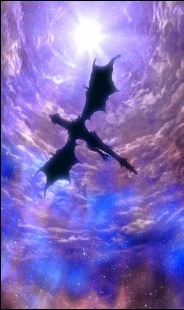What are Dragons?

Why am I including Dragons on this site? Maybe it is because I have always loved them. As a small child I fell in love with dragons and I wanted one as a pet. I had a deep belief that dragons were good beings: my idea was more like a large flying intelligent dog. I never associated dragons as the typical evil beast that flew around eating people and burning fields to the ground. Although the latter view is typical of Western mythology and what is depicted in most movies.
The mythology is of a large beast, obsessed with gold and on a destructive path to kill all humans. That is why the mighty warrior must chase the beast down and slaughter it. This view became so entrenched in our culture that fantasy writers have taken up the crusade against them (although one of my favorite series as a child was “Dragonriders of Pern” by Anne McCaffrey because it was the opposite). Dungeon and Dragons and other games pitted the mighty against the giant beasts and the legends of Dragons and their rage continue.
But what if we are wrong? Chinese dragons are quite the opposite of our view of them. Dragons are a symbol of power and strength in their mythology and are seen as good luck symbols for some. They are viewed more as a powerful being then a destructive force and have been associated with the Emperor and other noble people of the culture.
In other Eastern mythology the dragon is also revered and looked upon as powerful and sometimes spiritual beings. Some of the cultures even associate them with natural elements, like the Chinese believe that they can control rain. Most of the cultures also believe that they can shape shift and some humans can even become dragons.
With the mythology of the Dragon being so completely opposite from Western to Eastern it is a bit confusing as to what Dragons truly are. Perhaps they are speaking of two different types of animal, or perhaps they are speaking of past and present, or maybe they are just speaking of their own views of their own cultures. In any case Dragons are on this site because I believe there is more to these stories and, as they are magnificent creatures in either view, I believe that the more I yearn to understand about them the more information will come and can be shared.
The mythology is of a large beast, obsessed with gold and on a destructive path to kill all humans. That is why the mighty warrior must chase the beast down and slaughter it. This view became so entrenched in our culture that fantasy writers have taken up the crusade against them (although one of my favorite series as a child was “Dragonriders of Pern” by Anne McCaffrey because it was the opposite). Dungeon and Dragons and other games pitted the mighty against the giant beasts and the legends of Dragons and their rage continue.
But what if we are wrong? Chinese dragons are quite the opposite of our view of them. Dragons are a symbol of power and strength in their mythology and are seen as good luck symbols for some. They are viewed more as a powerful being then a destructive force and have been associated with the Emperor and other noble people of the culture.
In other Eastern mythology the dragon is also revered and looked upon as powerful and sometimes spiritual beings. Some of the cultures even associate them with natural elements, like the Chinese believe that they can control rain. Most of the cultures also believe that they can shape shift and some humans can even become dragons.
With the mythology of the Dragon being so completely opposite from Western to Eastern it is a bit confusing as to what Dragons truly are. Perhaps they are speaking of two different types of animal, or perhaps they are speaking of past and present, or maybe they are just speaking of their own views of their own cultures. In any case Dragons are on this site because I believe there is more to these stories and, as they are magnificent creatures in either view, I believe that the more I yearn to understand about them the more information will come and can be shared.